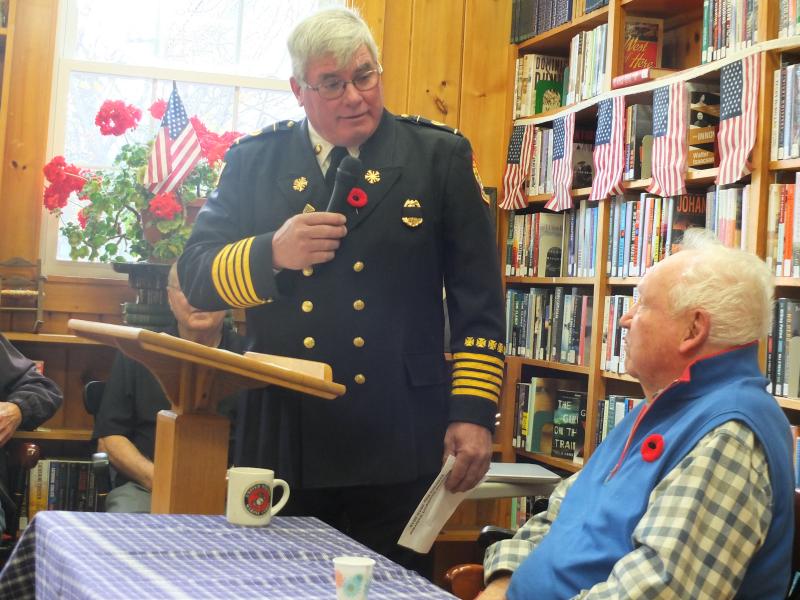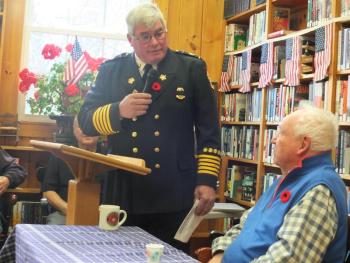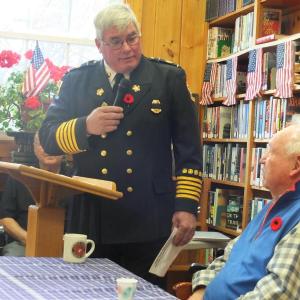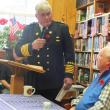Marine witnessed Japanese surrendering Chinese territory during World War II
 During the Veterans Day ceremony, Southport Memorial Library Trustee Gerry Gamage thanks World War II veteran John Druce for his service. BILL PEARSON/Boothbay Register
During the Veterans Day ceremony, Southport Memorial Library Trustee Gerry Gamage thanks World War II veteran John Druce for his service. BILL PEARSON/Boothbay Register
 During the Veterans Day ceremony, Southport Memorial Library Trustee Gerry Gamage thanks World War II veteran John Druce for his service. BILL PEARSON/Boothbay Register
During the Veterans Day ceremony, Southport Memorial Library Trustee Gerry Gamage thanks World War II veteran John Druce for his service. BILL PEARSON/Boothbay Register
As a young, First Lieutenant Marine, John Druce fought against the Japanese Empire during World War II. In 1942, the Boothbay Harbor native trained at Marine bases in Parris Island, South Carolina and Quantico, Virginia before being sent to the South Pacific.
When the 21-year-old arrived at Guadalcanal military base, located in the Solomon Islands, he saw a large 40-foot by 4-foot sign that U.S. Pacific Naval Fleet Commander Chester W. Nimitz left for arriving military personnel.
“Kill Japs. Kill more Japs. And kill the God dam bastards,” Druce recalled the admiral’s famous words.
Druce, 94, was the guest speaker Nov. 11 at the Southport Memorial Library’s Veterans Day event. He recalled his experience in the South Pacific witnessing and signing the eventual treaty which surrendered Japan’s possessions in China seized during the eight-year conflict between the two Asian countries.
When Druce arrived at Guadalcanal, he described the Allies as being in the “mopping up” stages of the war. But he was there long enough to understand Nimitz’s sentiments toward the enemy. He told over 40 people assembled in the library about captured Fiji Island natives being held by the Japanese. He recalled their gratitude for being freed.
“The Fijis were helping us attack the Japanese and they got stuck on a hill. When we rescued them, they thanked and hugged us because everyone knew how atrocious the Japanese treated their prisoners,” Druce said.
In August 1945, Druce and four other lieutenants were sent to China. They were assigned three tasks in the days following Japan’s surrendering to Allied forces: Supervise the return of defeated Japanese soldiers home, prepare for the return of ally Chiang Kai-shek and his military forces to China, and ready Peking for the U.S. Marines First Division accepting the official transfer of power.
Druce and his fellow Americans were vastly outnumbered by the approximately 200,000 Japanese soldiers and an emerging Chinese contingent of communists under the leadership of Mao Tse-tung.
Druce told about his first visit to Peking, the Chinese capital city. He recalls Mao’s picture being everywhere and the communists not happy to see Americans in the city, but other Chinese being happy to see them.
“We were the first white men to enter the city since the war started. Once we got there, we were treated as heroes,” Druce said.
The four Americans’ journey eventually led them to an airfield where the defeated Japanese soldiers were located. Druce told about the trepidation he felt about being outnumbered by such an overwhelming number of Japanese soldiers.
“I couldn’t believe my eyes. There was about 200,000 of them,” he said. “All of sudden they met us, bowed and surrendered. It was unbelievable after hearing how ferocious they were to see them act like this.”
The four lieutenants spent a month preparing the country for a post-war China. Druce — through the use of an interpreter — befriended the captured Japanese prisoners. “It was really an unbelievable situation. They showed us ‘The Forbidden City’ (the imperial palaces of the Ming and Qing dynasties). I can’t relay all my stories, but I can say I had one heck of a good time.”
On Sept. 9, 1945, the U.S. Marines First Division officially accepted Japan’s surrender of the Chinese territories claimed during the war. Fourteen Japanese officers surrendered their sabres during the ceremony. Druce not only had a front row seat to witness the surrender, he also participated in the ceremony. A Japanese officer he befriended requested he join military officers at the signing.
“He had me sign my name to the surrender papers. I don’t know if it was a witness or what, but I signed it John Dix Druce, U.S. Marine Reserve,” he said.
Druce later wrote about his experience in China. The book, “The John D. Druce Memoir,” is in the U.S. Marine Corps archives. He told the audience he saw the South Pacific “from top to bottom“ and had a wonderful time.
“I’m no hero and I’m thankful to be healthy. I go to church every Sunday because I believe somebody was looking out for me,” he said.
Druce admitted that some of his family members don’t believe his war story because the surrender papers were lost.
“Somebody took them and one of the sabres,” he said.
Druce finished his military service as a First Lieutenant.
Event Date
Address
United States


























